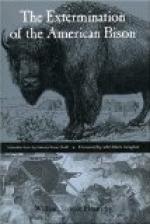But it must be admitted that the buffalo of the past was very often a most stupid reasoner. He would deliberately walk into a quicksand, where hundreds of his companions were already ingulfed and in their death-struggle. He would quit feeding, run half a mile, and rush headlong into a moving train of cars that happened to come between him and the main herd on the other side of the track. He allowed himself to be impounded and slaughtered by a howling mob in a rudely constructed pen, which a combined effort on the part of three or four old bulls would have utterly demolished at any point. A herd of a thousand buffaloes would allow an armed hunter to gallop into their midst, very often within arm’s-length, when any of the bulls nearest him might easily have bowled him over and had him trampled to death in a moment. The hunter who would ride in that manner into a herd of the Cape buffaloes of Africa (Bubalus caffer) would be unhorsed and killed before he had gone half a furlong.
(2) Curiosity.—The buffalo of the past possessed but little curiosity; he was too dull to entertain many unnecessary thoughts. Had he possessed more of this peculiar trait, which is the mark of an inquiring mind, he would much sooner have accomplished a comprehension of the dangers that proved his destruction. His stolid indifference to everything he did not understand cost him his existence, although in later years he displayed more interest in his environment. On one occasion in hunting I staked my success with an old bull I was pursuing on the chance that when he reached the crest of a ridge his curiosity would prompt him to pause an instant to look at me. Up to that moment he had had only one quick glance at me before he started to run. As he climbed the slope ahead of me, in full view, I dismounted and made ready to fire the instant he should pause to look at me. As I expected, he did come to a fall stop on the crest of the ridge, and turned half around to look at me. But for his curiosity I should have been obliged to fire at him under very serious disadvantages.
(3) Fear.—With the buffalo, fear of man is now the ruling passion. Says Colonel Dodge: “He is as timid about his flank and rear as a raw recruit. When traveling nothing in front stops him, but an unusual object in the rear will send him to the right-about [toward the main body of the herd] at the top of his speed.”
(4) Courage.—It was very seldom that the buffalo evinced any courage save that of despair, which even cowards possess. Unconscious of his strength, his only thought was flight, and it was only when brought to bay that he was ready to fight. Now and then, however, in the chase, the buffalo turned upon his pursuer and overthrew horse and rider. Sometimes the tables were completely turned, and the hunter found his only safety in flight. During the buffalo slaughter the butchers sometimes had narrow escapes from buffaloes supposed to be dead or mortally wounded, and a story comes from the great northern range south of Glendive of a hunter who was killed by an old bull whose tongue he had actually cut out in the belief that he was dead.




